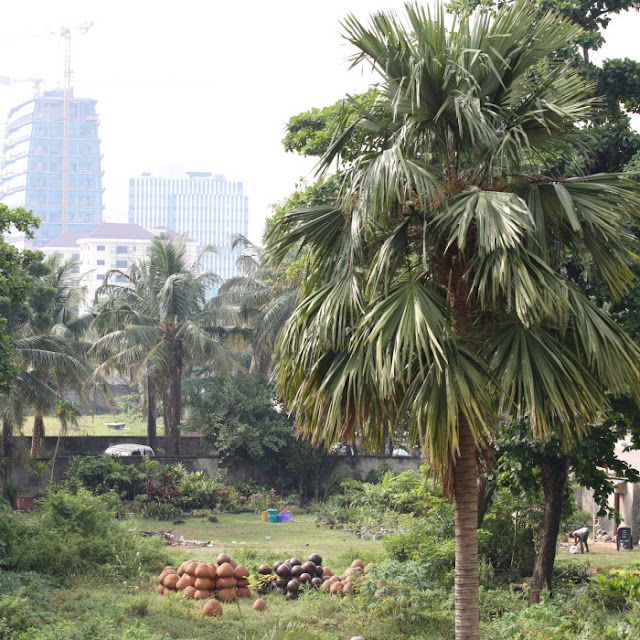 |
| family entertainment on Christmas day |
Ikoyi was known several decades ago, for its greenery, mature gardens surrounding old colonial houses. The hot and humid Lagos weather has hurt the old houses of the past century. Oil money and the search for profit have also contributed to the redevelopment of these leafy compounds into sterile modern multi-story buildings where the garden has "dramatically" been replaced with a parking lot and the lawn by concrete or tiles. An irreversible mutation has started. Somehow the economic crisis of 2015/2016 was a good catalyst for key people to stash their money into buildings instead of keeping suitcases of dollars under their mattress. The election of a new president focused on anti-corruption only strengthened that movement. The influx of construction together with the crisis have had the consequence of bringing lease prices down, which is good news for those leasing it.
Yet many plots remain unused because of complex succession issues. They are usually under the administration of a lawyer, who appoints a care-taker responsible for looking after the place. How he does that is often left up to him. He first needs to get some mallams (by extension Hausa people, the name comes from the Arabic muallim, the learned ones because they went to Coranic school) for security. The hardship of life will push those poorly paid guys to resourcefully engage into small businesses directly or indirectly. A small eatery, a corner shop, a plant nursery, a place for betting, using the space for collecting metal scrap, a place to watch English Premier League matches, a beer parlour, and if there is a bore-hole, water lorries might actually adopt the place to fill-up their tanks and park at night...
A while ago, a serious entrepreneur / care-taker of a plot on Gerrard Road, got into trouble after it was discovered that he had run a flourishing business of leasing the place to others to sleep, set-up a TV corner to watch UK Premier League football matches and several other activities. With those, he could afford buying a jeep and several houses. The land-owner was living in America, the lawyer was enjoying his administration fee and the care-taker was enjoying the fruits of his ingenuity. Alas one day, a relative of the owner discovered that business. The whole thing was shut down and the care-taker was made to surrender his ill-gotten gains.
Next to where I live, I have had the opportunity to witness the evolution of a compound going through a complete transformation.
 |
| the colonial house that no longer stands |
A new set of guards were brought in as the squatters of the former house and the boys quarter had been evicted. The night guard was sleeping in the small guard house with his wife and a young daughter. Sometimes he was relieved by another guard who received the visit of a lady half his age that he passionately hugged on the doorsteps of the shed before freeing her up so that she could go to work.
Soon after, the patrols of Kick-Against-Indiscipline made all road-side plant nurseries and other small businesses vacate the public space: it was forbidden to sell food (to the great discomfort of all house staff of Ikoyi), to hawk, to have an open-air hair-dressing salon, to sell vegetables and fruits, the roadside had to be freed from human activities and left only to receive the plastic garbages that would not fail to accumulate on the barren ground.
The Kick Against Indiscipline impulsed a revival of the neighbouring compound. A large plant nursery relocated inside, a kitchen was set up next to guard shed and benches installed under a large tree nearby. Some customers came every morning, but success did not seem to be guaranteed. "That woman is dirty, I no go eat his food" concluded my driver after surveying the place. Then came the tokunbo boys, guys repairing and/or dismantling imported second-hand cars. They also helped inflating and vulcanising tyres. Day workers had installed small wooden or metal boxes to keep their belongings along the plant nursery. An open-air shower corner was put together next to the guard house, though on hot days men would bucket-shower in the open under the sun. A friend or an associate of the guard came with a large red van which became the source of quite a lot of activity around tyres. The damaged ones were burnt at night to dispose of them filling up the air with a nasty smell. A whole collection of earthen pots appeared in the middle of the grass and I thought for a while that they would start a workshop after seeing on the last day of 2016 a woman engrave decorations with a knife on them.
 |
| clay pots rescued from Kick Against Indiscipline |
Six months have past, I don't see the guard with the wife and the daughter anymore, nor the associate with the red van. But two weeks ago, a new night of back and forth happened, this time to bring a load of scrap metal under the tree that used to serve as a restaurant. A new batch of people is apparently in charge of the place. A large truck came to load a large portion of the scrap metal. It took them the whole day to load before bringing it to the recycling plant. Boys collect scrap metal from the street in wheelbarrows and bring their finds to the compound for a small fee.
 |
| sand, scrap metal, plants and soon a small supermarket |
Comments
Post a Comment